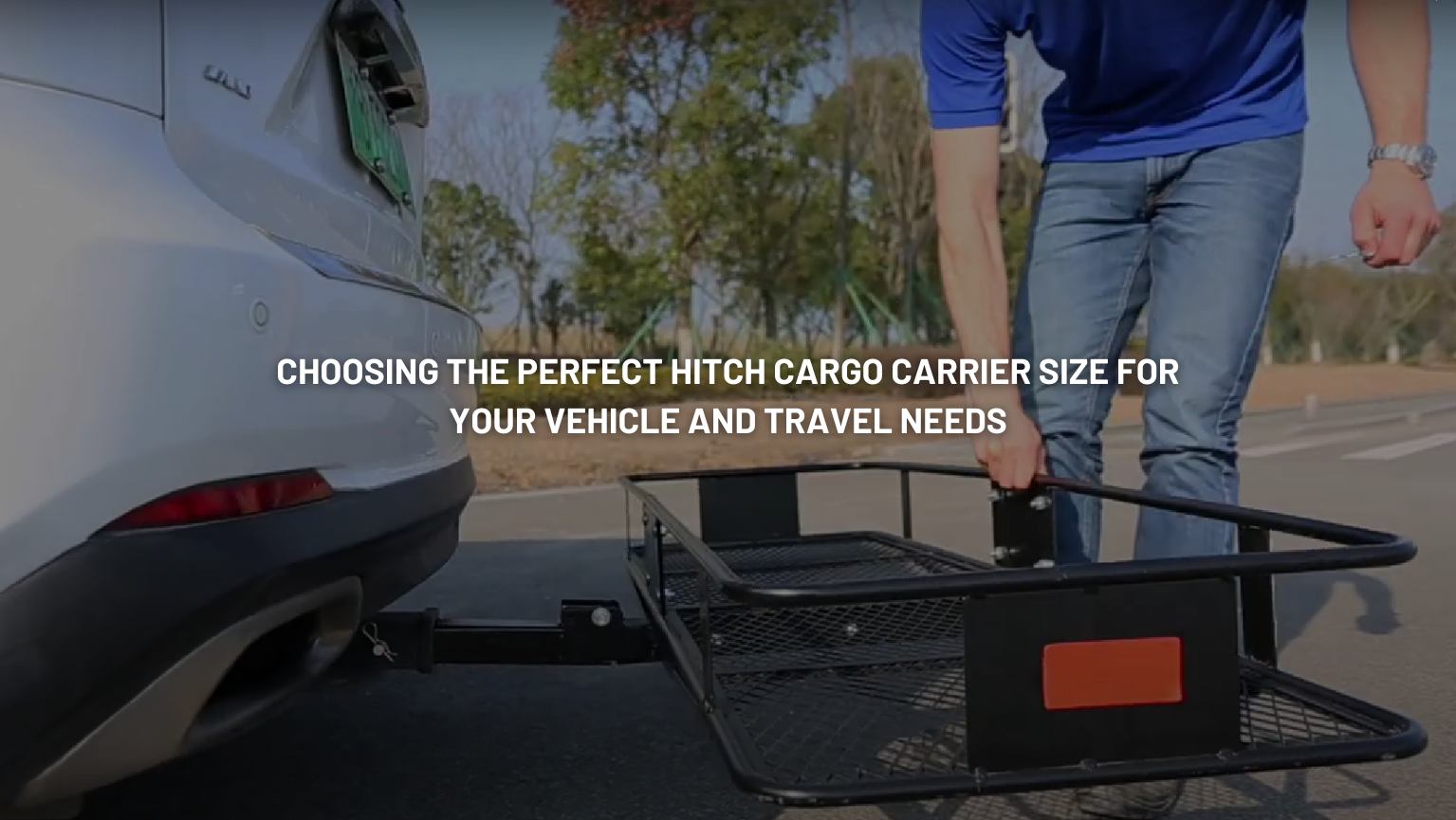Choosing The Perfect Hitch Cargo Carrier Size
When planning a road trip or outdoor adventure, having enough space to pack all your necessary luggage and gear is essential. While a roof rack may be a popular option for extra storage, a hitch cargo carrier offers a more versatile and accessible solution. However, with various sizes available, choosing the perfect hitch cargo carrier for your needs is essential. In this post, we’ll explore the factors to consider and tips for selecting the correct size hitch cargo carrier.

Factors to Consider When Choosing a Hitch Cargo Carrier Size
Before choosing a hitch cargo carrier, it’s essential to consider the following factors:
Vehicle’s hitch receiver size and weight capacity: The size and weight capacity of your vehicle’s hitch receiver will determine the size of the cargo carrier you can use. Make sure to check your vehicle’s manual or consult with a professional to ensure compatibility.
Luggage or cargo weight and dimensions: The weight and dimensions of your baggage or cargo will also impact the carrier size you need. Consider the size and weight of your most oversized item and choose a carrier that can accommodate it.
Several passengers and available interior space: If you’re traveling with a large group or have limited interior space in your vehicle, you may need a larger cargo carrier to accommodate everyone’s luggage and gear.
Hitch Cargo Carrier Size Options
Once you’ve determined the factors above, you can explore the different size options for hitch cargo carriers. There are generally three size categories:
Small and compact hitch cargo carriers: These carriers typically have a weight capacity of up to 300 pounds and offer a small amount of storage space. They are easy to handle and maneuver but may only be suitable for a few oversized items or extended trips.
Medium-sized hitch cargo carriers: With weight capacities of up to 500 pounds, medium-sized carriers offer a balance between storage capacity and ease of use. They can accommodate more oversized items but may still be compact enough to handle easily.
Large and extra-large hitch cargo carriers: These carriers have weight capacities of 500 pounds or more and offer ample storage space for extended trips or more oversized items. However, they may be bulkier and more difficult to handle and may require additional accessories such as lights or reflectors.
Tips for Choosing The Right Size Hitch Cargo Carrier
Consider the type of luggage or cargo you’ll be carrying: If you have larger or heavier items, you may need a larger carrier to accommodate them.
Choose a size compatible with your vehicle’s weight capacity and hitch receiver size: Consult your vehicle’s manual or a professional to ensure compatibility.
Think about ease of use and maneuverability when making a decision: Consider how easy the carrier will be to handle and maneuver, especially when loading and unloading.
Benefits of Hitch-Mounted Cargo Carrier
Using a cargo carrier can provide numerous benefits for travellers.
Firstly, it can increase your vehicle’s storage space, allowing you to pack more luggage and equipment for your trip. This is especially useful for families or larger groups requiring extra space for their belongings.
Additionally, cargo carriers can free up interior space in your vehicle, making the journey more comfortable for passengers. They can also protect your belongings from the elements and prevent them from getting damaged during transport.
Finally, a cargo carrier can improve the aerodynamics of your vehicle and reduce drag, leading to improved fuel efficiency and lower gas costs. A cargo carrier can be a valuable investment for any traveller looking to maximize their storage space and improve their travel experience.
Conclusion
In conclusion, choosing the perfect hitch cargo carrier size can make all the difference regarding travel and storage needs. By considering factors such as weight capacity, storage space, and compatibility with your vehicle’s hitch receiver, you can make an informed decision and choose the suitable carrier for your needs. Whether you’re embarking on a road trip or need extra storage space, a hitch cargo carrier can be a valuable investment for any traveler
FAQ's
- What is the weight capacity of a hitch cargo carrier?
The weight capacity of a hitch cargo carrier can vary depending on the carrier’s size and type. Small pages may have a weight capacity of up to 300 pounds, while larger carriers can hold 500 pounds or more.
- How much storage space does a hitch cargo carrier have?
The storage capacity of a hitch cargo carrier can vary depending on the carrier’s size and shape. Small carriers may have limited storage space, while larger pages can have ample room to fit luggage and other cargo.
- How is my vehicle’s hitch receiver compatible with a hitch cargo carrier?
Before purchasing a hitch cargo carrier, check your vehicle’s hitch receiver size and weight capacity to ensure it is compatible with the page you want to use. Most hitch cargo carriers are designed to fit standard 2-inch hitch receivers.
- Can I use any luggage or cargo with a hitch cargo carrier?
Most hitch cargo carriers are designed to accommodate standard luggage and cargo sizes. However, checking the carrier’s dimensions and weight capacity is essential before loading it with your items. Some airlines may need to be more suitable for larger or irregularly shaped items.
- What are some tips for choosing the perfect hitch cargo carrier size?
When selecting a hitch cargo carrier size, it’s essential to consider both the weight and dimensions of your luggage and cargo and your vehicle’s weight capacity and hitch receiver size. You should also consider the type of travel you’ll be doing and how much storage space you’ll need. It’s always better to choose a slightly larger carrier than one too small to avoid overloading it.

